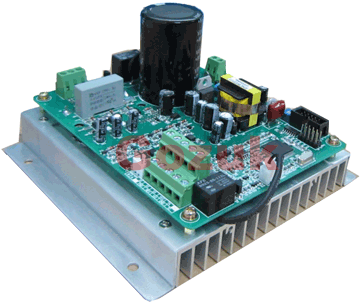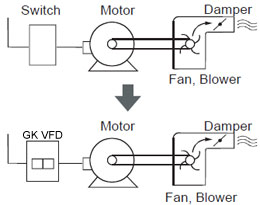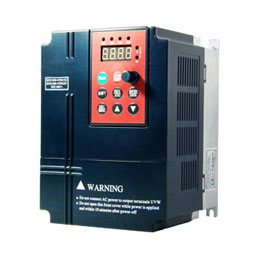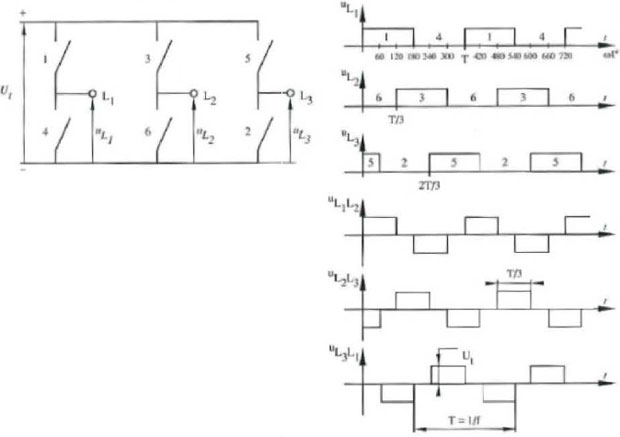Select the right motor for variable frequency drives
As Variable Frequency Drives (VFD) gaining more acceptances among Fluid Power Engineers, ability to select and size correct electric motor and VFD is becoming more critical as applications are getting more demanding. I like to share my experiences here with you since I see common misapplications of motors and variable frequency drives. I hope you find them interesting and useful. I'll start with motor enclosure selection.
Wrong motor enclosure selection can results in complete design failure, especially in applications where a combination of VFD and fixed displacement pumps are used in variable flow with compensated pressure settings ("P" control mode). When using variable displacement pump with Fixed RPM motor, it is desirable to use TENV (Totally Enclosed None Ventilated) or TEFC (Totally Enclosed Fan Cooled) frame motors, since they have relatively larger rotor diameter with inherently high rotor inertia. Rotors with high Inertia in Fixed RPM applications acts as a flywheel stabilizing motor RPM during rapid torque changes.
When operating variable speed motor with fixed and positive displacement pumps, motors with large rotor inertia works against you, this will be evident during sluggish pressure recovery when flow increases and pressure overshoots during flow reduces. Let's look at a 4 Pole 1800 RPM 20HP HPU motor, a typical TEFC motor has rotor inertia of 2.42 Lb-FT2 while a DP-FV (Drip Proof Force Ventilated) motor has rotor inertia of 0.52 Lb-FT2. If pump has to recover from pressure drop by increasing its speed by 200 RPM in 0.1 sec, the TEFC motor needs 23.6 Ft-Lb of torque to accelerate, while the DP-FV motor only needs 5 Ft-Lb of torque. This translates to addition of 8HP to response to pressure drop by TEFC motor, while the DP-FV motor only needs 1.7HP!
Also see what types of motor can be used on VFD?
Wrong motor enclosure selection can results in complete design failure, especially in applications where a combination of VFD and fixed displacement pumps are used in variable flow with compensated pressure settings ("P" control mode). When using variable displacement pump with Fixed RPM motor, it is desirable to use TENV (Totally Enclosed None Ventilated) or TEFC (Totally Enclosed Fan Cooled) frame motors, since they have relatively larger rotor diameter with inherently high rotor inertia. Rotors with high Inertia in Fixed RPM applications acts as a flywheel stabilizing motor RPM during rapid torque changes.
When operating variable speed motor with fixed and positive displacement pumps, motors with large rotor inertia works against you, this will be evident during sluggish pressure recovery when flow increases and pressure overshoots during flow reduces. Let's look at a 4 Pole 1800 RPM 20HP HPU motor, a typical TEFC motor has rotor inertia of 2.42 Lb-FT2 while a DP-FV (Drip Proof Force Ventilated) motor has rotor inertia of 0.52 Lb-FT2. If pump has to recover from pressure drop by increasing its speed by 200 RPM in 0.1 sec, the TEFC motor needs 23.6 Ft-Lb of torque to accelerate, while the DP-FV motor only needs 5 Ft-Lb of torque. This translates to addition of 8HP to response to pressure drop by TEFC motor, while the DP-FV motor only needs 1.7HP!
Also see what types of motor can be used on VFD?
Well..in case you are opting for VFD compatible motors , you should go for VPI insulation . This is generally offered for medium voltage motors but you should opt for low voltage motors also in case u prefer using the motor with VFD. Also insulated bearing is must. High frequency harmonics should not travel to bearing otherwise bearing may fail early.
Post a Comment:
You may also like:
Featured Articles
Non-Enclosure Variable Frequency Drive ...
 No enclosure (cover), reducing installation space and cost effective. Widely used in All-In-One control cabinet. Keep the same ...
No enclosure (cover), reducing installation space and cost effective. Widely used in All-In-One control cabinet. Keep the same ...
 No enclosure (cover), reducing installation space and cost effective. Widely used in All-In-One control cabinet. Keep the same ...
No enclosure (cover), reducing installation space and cost effective. Widely used in All-In-One control cabinet. Keep the same ...Variable frequency drive application ...
 Variable Frequency Drive (VFD) can be used in lots of fields. Variable frequency drives are widely used to control the speed of ...
Variable Frequency Drive (VFD) can be used in lots of fields. Variable frequency drives are widely used to control the speed of ...
 Variable Frequency Drive (VFD) can be used in lots of fields. Variable frequency drives are widely used to control the speed of ...
Variable Frequency Drive (VFD) can be used in lots of fields. Variable frequency drives are widely used to control the speed of ...Variable frequency drive in HVAC ...
 Variable frequency drives (VFD) have been used for HVAC systems in buildings for more than 40 years. But only in recent years, ...
Variable frequency drives (VFD) have been used for HVAC systems in buildings for more than 40 years. But only in recent years, ...
 Variable frequency drives (VFD) have been used for HVAC systems in buildings for more than 40 years. But only in recent years, ...
Variable frequency drives (VFD) have been used for HVAC systems in buildings for more than 40 years. But only in recent years, ...Variable Frequency Drive Harmonics and ...
A discussion of the benefits of variable frequency drives often leads to a question regarding electrical harmonic distortion ...
Three phase inverters
 In the variable frequency drive rectifier paper, it explains how to go from three phase alternating current voltage to a direct ...
In the variable frequency drive rectifier paper, it explains how to go from three phase alternating current voltage to a direct ...
 In the variable frequency drive rectifier paper, it explains how to go from three phase alternating current voltage to a direct ...
In the variable frequency drive rectifier paper, it explains how to go from three phase alternating current voltage to a direct ...
VFD manufacturers
